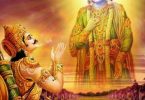Question: We are studying 10 offences recently. i have some questions from Harinama Cintamani. can you help me in this regard?
Questions from Harinama Cintamani:
Question: 1. There are four kinds of blasphemy of a devotee. The offender criticizes a Vaisnava about
1) his caste, or
2) some unpremeditated accidental fall-down,
3) or the last traces of his previous sins,
4) or his sinful activities prior to his surrendering to Lord Krsna.
Such an offender will never develop a taste for chanting the holy name.
What is the difference between #2 and #3? Can you give some example?
Answer by Romapada Swami:
A. 1. #2 is addressing sensual weakness that results in a circumstantial return to #4.
#3 is residual sinful/materialistic tendancy that lingers, as one gradually approached the position becoming fully cleansed of past impurity.
Examples:
#3 may be the lingering use of coarse, street language by a devotee who is still in the process of trying to become purified. Or perhaps his/her taking non-offered but vegetarian food, simply due to haste of circumstance and forgetting to offer their food first. Or perhaps a new devotee man/woman casually touching a member of the opposite sex — not in a lusty-agressive manner, but more as a carry-over of previous social habit.
#2 indicates a circumstantial falldown.
**********
Question: 2. In chapter 4, the 10 offences are listed. why the no. 6 (explain the holy name in a material way) of Srila Prabhupada’s 10 offence is not mentioned there? Is it similar to consider the holy name as auspicious sacrifices recommend by karma kanda?
Answer by Romapada Swami: 2. Considering his Western audience, Srila Prabhupada chose to alter/adjust the Padma Purana list by bifurcating item #6 into two divisions; they are related, but not identical. Inattention (pramada) was moved to the position of ‘an additional offense.’
Question: 3. ”one can worship demigod as guru-avatara and saktyavesa-avatara”, what is the meaning of guru-avatara?
Answer by Romapada Swami : 3. Lord Siva, for example, is not to be worshiped as a demigod *BUT* he has his own sampradaya and can be worshiped within his sampradaya as such. Same for Lord Brahma.
Question: 4. “saktyavesa-avatara means the servant of Visnu, isn’t it?”
Answer by Romapada Swami : 4. No. Every jiva is a servant of Vishnu, but is not “an empowered incarnation of Vishnu.” That is the meaning of Saktyavesa-avatar.”







